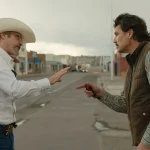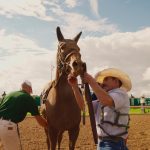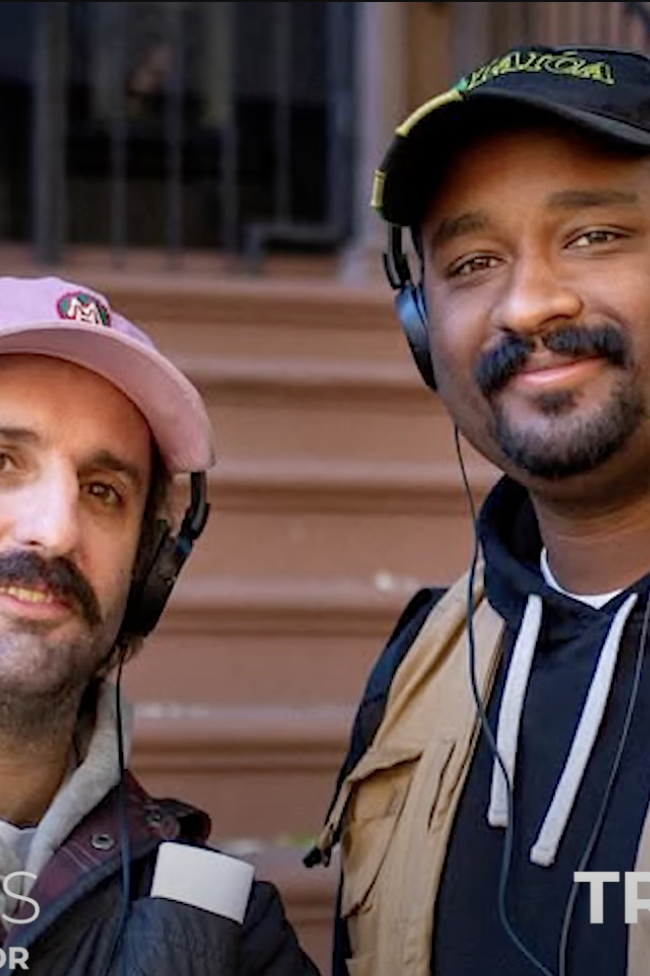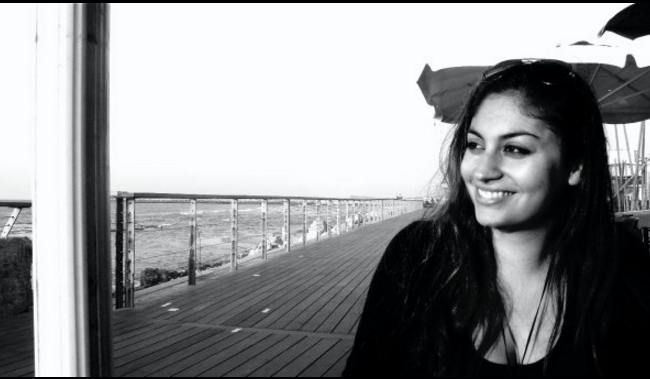A Conversation with Heather Courtney, Princess A. Hairston & Diane Quon (BREAKING THE NEWS)
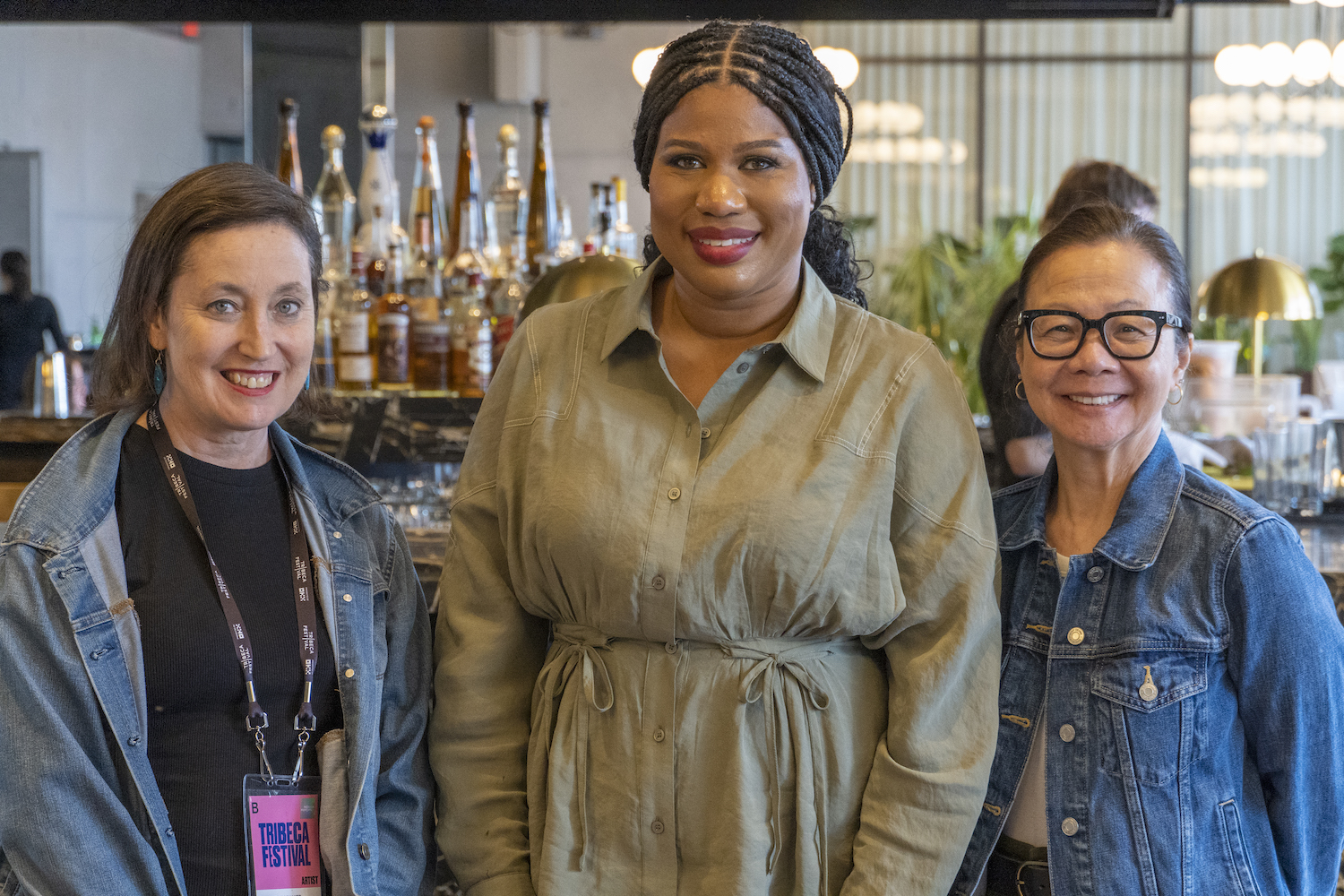
Directors Heather Courtney (The Unafraid), Princess A. Hairston, and Chelsea Hernandez (Building the American Dream) teamed up on the new documentary about the founding and growth of the website The 19th*, entitled Breaking the News, which just premiered at the 2023 Tribeca Film Festival (where I reviewed it). It’s a marvelous examination of the importance of a diverse news team to best represent as great a variety of points of view as possible. Billed as a “an independent, nonprofit newsroom reporting on gender, politics and policy,” The 19th* is a much-needed addition to our modern world. While at Tribeca, I had a chance to sit down for a chat with Courtney and Hairston, along with producer Diane Quon, and now here is that interview, edited for length and clarity.
Hammer to Nail: How did the three directors come together and decide to collaborate on the project?
Heather Courtney: I pitched it back in February 2020 to co-founders Emily Ramshaw and Amanda Zamora at The 19th*. And at the time I just had a loose idea of it being about their first year of existence, and I thought it would be really great to follow their reporters out in the field as they were covering the 2020 presidential campaign, through the gender lens via the eyes of their reporters. And then March 2020 happened and the whole country shut down and instead of traveling to Austin, Texas, to do my first shoot, I wound up just starting to record their Zoom meetings. And it turned out to be really interesting because then they also had to pivot in terms of what they were going to do, what they were going to focus on, and how were they going to raise the funds they needed to do their official launch later.
I’m very grateful that they let me in to record those meetings at such a vulnerable time. And I still didn’t quite know what the film was going to be because nobody wants to watch a film of Zoom meetings, but I finally was able to film in person in August 2020 when they did their official launch. I drove from Los Angeles to Austin to film that day, and then after that day I was like, “OK, there’s something here and we can make this work somehow.” And that’s when I started to reach out to potential collaborators. Actually the day after the launch, I reached out to Chelsea Hernandez because she lives in Austin.
And eventually we then approached Diane Quon, and then Princess Hairston. So it was like building a team that would emulate what The 19th* was trying to do, as well, since they were trying to build a diverse team of inclusion and equity, and I felt like as a film team, we should try and do the same thing. And I didn’t want to be a solo director in that regard. I felt it would be a much better film with co-directors. And so luckily they all came on.
HtN: Princess, how was this pitched to you and what attracted you to the project?
Princess A. Hairston: It was pitched that there are a group of women who are starting this new digital-news startup that is going to be very inclusive in their storytelling and not be the standard objective white-male status quo in the newsroom. And so I was super psyched about it. I, along with Heather and Chelsea, both at one point wanted to get into journalism. I went to an HBCU and actually worked in the newsroom. I volunteered. I really thought I could get a job in journalism. And after graduating from college, I realized that was going to be a very challenging thing and I could not get a job in journalism. So I switched to filmmaking. And so I was very excited about this project and also knowing that it was going to be with two other women filmmakers.
HtN: Diane, how about you? What attracted you to the project?
Diane Quon: I loved the premise of what The 19th* was going to be about. And being part of the AAPI community, I felt like often those are stories that are not told. And to be able to support a film that’s going to talk about an organization that cares about that, I wanted to be part of that. Plus, I have three daughters and I showed them the demo that Heather had shared with me, and they all said, “Mom, you have to do this.” And so when your daughters say you’ve got to do it, you’ve got to do it.
HtN: Another collaborator is Jamie Boyle. I was really excited to see her name pop up on the screen because I had just reviewed her own film Anonymous Sister. How did you end up teaming up with her? She’s credited as a co-editor and a writer.
HC: So, we originally worked with Kristina Motwani as our first editor, and she got us to a great point with an assembly. And then we started just looking for other editors and I think we watched Anonymous Sister, which is such a great combination of vérité and archival and interview, which is … I mean, our film’s very different from her film, but it also has that combination of different kinds of footage and she seemed very passionate about the subject matter. So we talked to her and luckily she was available.
HtN: How did the breakdown of labor happen with the three of you? Was some of it by geography, because you’re in different parts of the country and so you would handle different parts of the shoots?
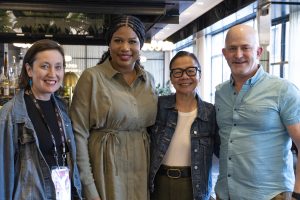
Heather Courtney, Princess Hairston, Diane Quon and Chris Reed
PAH: It was, and we still needed help because of geography and time. It was a combination of when the journalists were available, when we could get in with them. I kind of focused on the Northeast, so anything from New York to DC, which included Errin Haines, as well as breaking-news members. And then Chelsea focused on Chabeli Carrazana, who was in Florida, as well as Emily and The 19th* staff around Austin. And then Heather actually went around the country. She filmed in Austin, she filmed in Los Angeles, New Hampshire, in Philly with Errin during the early months. So once other team members came on, then we kind of spread out who would be filming where.
HC: I feel like this film couldn’t have been made any other way, really. It had to have all of us.
DQ: Especially during COVID times, it made it much safer and more efficient, the fact that they didn’t have to fly across the country, otherwise we wouldn’t have been able to do that. And they were able to build trust, because they then became the main person. With Chabeli, it was Chelsea who was always interviewing here.
HtN: That makes sense. This is the perfect kind of team for this kind of film at this time. How long would you say it took you to make it, start to finish?
HC: I’d say March 2020 till when we finished about a month ago. So a little over three years, which I think is actually pretty good for a documentary. It’s often four or five or more years.
DQ: And we had originally thought 2022. We had hoped to just get it out there, but with COVID, when we thought we were going to go back to shooting, then Omicron happened. Every time we thought we were going to go back out there, things happened. And looking back at it now, we would not have been able to capture the whole story about the overturning of Roe v. Wade, which is such an important part of the film, showing why The 19th* needs to exist.
HtN: You talk about how you wanted to make a film celebrating women, and you have a team of women, but in the movie there is a challenge because not everyone who works for The 19th* identifies as a woman. And I really appreciated you including in the film the whole challenges to navigating Kate Sosin’s gender identity. I’m just curious how you approached that topic in the movie.
HC: That’s a really good question. When I was first filming when I went to the launch day in Austin, you’ll see in the film at the end of that scene that Emily says to Amanda, her co-founder, “Oh, have you seen the Slack message? We need to talk about this.” And then she goes, “Heather, this isn’t for the film.” And then the next scene is Kate basically talking about what had happened and how upset they were that day during launch because it was just so women-centric and nobody even was acknowledging different gender identities at all.
And so we weren’t necessarily let into all of those discussions, but Kate was very willing to talk about it, and we sort of saw how it started to change just in the way they started to build the team differently. We were able to observe that and we were able to ask Emily and Amanda tough questions about it and sort of see how they got to this other place. So I think we didn’t shy away from including conflict, whether it was around gender or whether it was around race and blind spots. We did not shy away from it because it’s part of the process. It’s part of how they grew and changed. And I think it makes it a really good model for other organizations and newsrooms to not be afraid to make mistakes and mess up while you’re trying to make big changes, because that’s the only way you get to the other side of it.
PAH: We kind of followed the language and the evolving change within The 19th*. So in the beginning, it was about women coming together to change the landscape of legacy newsrooms, which were male-dominated. It wasn’t until they started hiring more, and then the LGBTQ+ factor came in, where we noticed the blind spots, because they weren’t prepared. They weren’t prepared to communicate with Kate and honor pronouns. And I think it’s just a learning lesson where you were stuck in this, “women, women, women.”
It changed the whole landscape where it became, “This is a group of women and LGBTQ+ journalists and gender equity, we now need to really factor that into this inclusion process and how do we become knowledgeable for all the folks that we are hiring and giving a voice in journalism?” So you kind of see the evolution. When we speak about the film’s early days, what brought us on was the group of women journalists coming together. Then as it came along and Kate came on and gender became a topic point, it was like, “Oh, this is waking us all up. We need to be on top of this.”
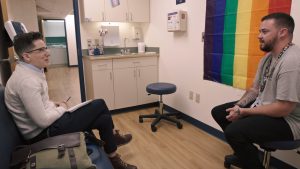
A still from BREAKING THE NEWS
HC: Yeah, I mean that’s really true, what Princess says. Because even when I pitched it back in February 2020, I was like, “Oh, I want to follow all these women following the presidential campaign.” You know what I mean? So it was also a learning process for me, too, and a very important one.
DQ: If you look at all our marketing materials, including our website and our treatment, it started with just saying “women.” And I think it was even just a month ago that we changed the log line to be more inclusive. So to Princess’s point, has their language changed? So did ours in many ways, as well.
HtN: On a lighter note, are you all dog people? Because you kept on giving us wonderful close-ups and singles of dogs. In fact, I wanted more. I wanted more dogs! (laughs) I’m a dog person, so I appreciated that.
PAH: I am not a dog person. I believe Heather and Chelsea are the dog folks.
HC: Well, she doesn’t have one, but she does like them.
HtN: I thought it was very sweet and I thought it was nice how many of them had dogs. We got those and kids, as well.
PAH: They were very much a part of the story in a way that actually helped in those intimate moments where they were dealing with a lot of challenges, reporting on challenging topics, themes, seeing how being isolated affected them, having to constantly be at the computer working affected them, and how their animals pretty much brought some lightness and some humor. You can see that in the film, how it carries over, where you have stories about Breonna Taylor, Central Park, misgendering. You’re having to write about these personal things from your lived experience. The dogs brought a sense of calm after heavy scenes, giving people in the audience, hopefully, time to process what just happened and bring a little bit of light at the end of a scene.
HtN: Definitely some comedy. Chabeli’s dog, her corgi, barking during the NPR piece, for example.
PAH: Oh, yeah. That was brilliant.
HC: He’s totally a scene stealer. (laughs) He needs his own Instagram.
HtN: Were there any moments that proved especially difficult to film and edit, beyond just sifting through all your material to put a coherent story together? Were there any challenges there?
HC: No. I mean, before I filmed at the Trans Health Clinic with Kate, I went through their director, Dallas is her name, and they took it to their people and they were fine with it. Only certain staff members wanted to be on camera, so I only filmed the interviews Kate did with those staff members, and we couldn’t film in the clinic or anything like that. So it was more just following Kate around as they were interviewing people at Trans Health. Princess, you did a lot of man-on-the-street stuff, more than I did, I think. Did you have any issues?
PAH: I did. I mean, we filmed a lot of stuff that’s not even in the film, but I think overall it was just challenging to film during a pandemic. So we were filming inside, Heather started, Chelsea and I came on and started going into people’s personal spaces, and then the summer of 2021, when we thought the pandemic was magically over, we all kind of went out and tried to each do a story, and then Delta hit and we were shut down again, and then back into their spaces. And then it was trying to find a balance of, “OK, we filmed them a little bit, maybe we need to give them a little bit of space.” It is very invasive to go into someone’s home during a pandemic. Then that winter schools were shut down. The spring comes, we try to go out and film again, and then it’s Omicron.
And so it took a lot of, “Hey, I just want to see what you’re reporting on. Could we get access to film? When would be a good time? Will you be out?” It was just a lot of producing in a sense of how can we really stay on top of following the story because they’re constantly reporting, but what are we going to follow? How are we going to get access? When are we going to get access? And how do we be safe traveling as a film team?
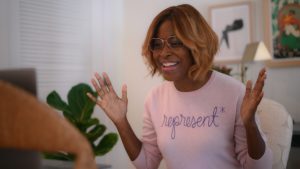
A still from BREAKING THE NEWS
HC: And since we did a lot of filming in their personal spaces, that was often them doing phone-call interviews with their subjects. So they would always ask whomever they were talking to beforehand, “I’m being filmed for a documentary, so when I do the interview with you over the phone, is it OK, do you mind that they’re filming?” So we always would go do that whole process first. And sometimes I would be filming Kate and I could film one phone call, but not the next one, that kind of thing. So there was definitely that extra layer.
PAH: It was strategic filmmaking where we had to be concise when we went into their space and get the gist of them working on the story. How are we going to film enough coverage for us to make the scene and then get out of their space?
HtN: Well, I’m really glad you persevered. I really enjoyed the film and I wish you all good things with it.
All: Thank you!
– Christopher Llewellyn Reed (@ChrisReedFilm)

